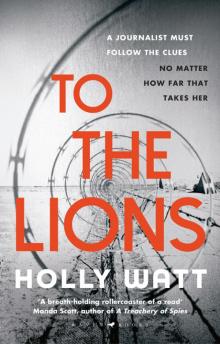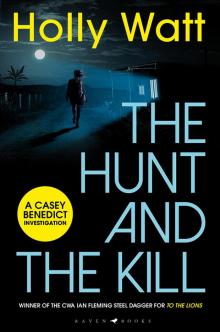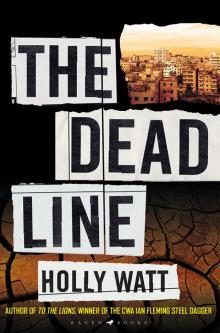- Home
- Holly Watt
The Dead Line
The Dead Line Read online
To Jonny
ALSO BY HOLLY WATT
To the Lions
CONTENTS
1
2
3
4
5
6
7
8
9
10
11
12
13
14
15
16
17
18
19
20
21
22
23
24
25
26
27
28
29
30
31
32
33
34
35
36
37
38
39
40
41
42
43
44
45
46
47
48
49
50
51
52
53
54
55
56
57
58
59
60
61
62
63
64
65
66
67
68
69
70
71
72
73
74
75
76
77
78
79
80
81
Acknowledgements
Note on the Author
1
The junior reporter was losing the battle with the news editor.
‘But Ross,’ Tillie was shouting as Casey walked past the newsdesk, ‘it might actually kill you.’
A couple of desks away, the home affairs editor looked up. ‘How?’ he asked hopefully.
‘You know how Ross takes his coffee?’ Tillie was holding the newsdesk phone, finger on the mute button.
‘Half and half.’ Casey paused. ‘Granules and hot water. It’ll kill him one day.’
‘With any luck’ – a mutter from the home affairs editor.
Ross was ignoring them all, head down over his newslist.
‘Ross’s wife is on the line.’ Tillie turned to Casey.
‘A brave woman,’ the home affairs editor said thoughtfully.
‘I do not,’ Ross snarled, ‘have time to speak to anyone right now.’
‘Mrs Warman says’ – unconsciously, Tillie put on a perfect imitation of Ross’s wife – ‘ “I put descaler in the kettle overnight, Tillie, and he’s boiled it up and made coffee this morning. I think he might actually die.” ’
‘Didn’t he notice when he was drinking it?’
‘Apparently, no.’
‘Will the descaler finish him off altogether?’ Casey asked. She couldn’t remember the home affairs editor smiling before.
‘I had to look it up,’ said Tillie. ‘Quite possibly, yes. I’ve told Ross he has to go to A&E.’
‘Ross.’ Casey tried to sound firm.
The news editor looked up. ‘Listen.’ Ross spoke with unusual patience. ‘If I’m dead in an hour, I’ll go to the doctor.’
Over Ross’s head, Casey was distracted by most of the fashion team clattering down the glass staircase in the middle of the Post’s open-plan office. For a moment, they reminded Casey of racehorses – long legs, glossy manes, jewel silks.
Casey sighed at her jeans. But that might mean . . .
She left Ross and Tillie to it and headed up the stairs.
‘Hello, Casey.’ Cressida, the fashion editor, blocked her path, sunny and knowing all at once. ‘What are you after?’
Casey’s eyes flickered. ‘I saw a navy top in the fashion spread this morning. It would be perfect for . . .’
‘The Juniper one? No.’
‘I just want to borrow it.’
‘And put a few holes in it for your secret cameras? Absolutely not.’
Week after week, the fashion team called in outfits from designers, photographed them in unlikely scenarios and couriered them back. Occasionally, Casey, the Post’s investigations reporter, diverted them.
‘Please.’ Casey extended the syllable. ‘I have to be a suave businesswoman.’
‘And that’ – Cressida looked her up and down – ‘is going to be quite the stretch, is it?’
‘How come you’re not out with the rest of your team?’ Casey tried distraction. ‘I just saw them all leaving.’
‘I’m following them. Running late. We’re off to do a feature on that big new shopping centre out in west London. Each member of the team is trying to track down a certain look in . . . Oh,’ Cressida flicked her hand. ‘I know you’re not really interested, Casey. Just take the wretched top.’
A quick smile. ‘You’re a star.’
‘I’ll tell Juniper that I must be buried in it, or something.’ Cressida smiled beatifically. ‘Now, do bugger off, Casey. I simply must go and shop.’
Casey sauntered back to the little investigations room, chucking the navy top on the sofa and throwing herself into her chair.
‘Here.’ She passed one coffee to Miranda and another to Hessa, and stared unenthusiastically at her own computer screen. ‘Has it ever occurred to you that shopping professionally might be more fun than this?’
‘You’d get bored.’ Miranda glanced up.
Miranda was Casey’s boss, technically, but they had forgotten about that a long time ago.
‘Bet I wouldn’t.’
Hessa passed Casey some notes. ‘I got what you wanted on that Manchester project. And I’ll drop that navy top off with Sagah in a bit.’
Sagah – a grumbling genius – would bury an unnoticeable camera in the folds of that beautiful navy top. A tiny microphone would be sewn into place close to the collar.
‘Thanks, Hessa,’ Casey grinned at her, taking an unenthusiastic sip of her coffee. ‘This actually does taste like descaler.’
‘What?’ Hessa glanced up.
‘Nothing.’ Casey waved the words away, and they all turned back to their work; three investigative journalists: a quiet conspiracy.
A few years earlier, Miranda had been poached from the Argus, the Post’s deadly rival.
‘You can set up your own team at the Post,’ Dash, the head of news, had promised. ‘Hand-picked. Whoever you want. And we’ll give you a free rein on whatever you want to investigate.’
‘But I’m in a good place at the Argus,’ Miranda had said. And she was: running their investigations team with a ruthless efficiency. She had just brought down a cabinet minister, for having both his wife and his mistress on the public payroll. The public was indifferent to the infidelity, but furious about the waste-of-taxpayers’-money. It was the cartoonists who destroyed him, in the end.
‘We’ll make you even better, here.’
Miranda caught sight of Casey the first day she arrived in the post. The young reporter was swearing fluently as she rushed to print out Ross’s story list for conference. A flame of energy, grey eyes missing nothing. Casey had glanced across at Miranda, just for a second, scepticism in every line.
But Casey had pounced on Dash later, as he was showing Miranda around the newsroom.
Me. Casey had insisted. I can do it. Please.
‘And this is Casey.’ Dash had waved a careless hand.
‘I can be invisible,’ Casey said. ‘I promise. I can do investigations. I’d be good.’
‘You can’t cross the room without starting a riot.’ Dash was smiling at the junior reporter.
‘I could serve you breakfast, and you wouldn’t notice’ – insisting, half-joking.
‘Casey,’ the news editor had bawled just then. ‘I need that bloody research for PMQs right fucking now.’
And Dash and Miranda had smiled at Casey, and her nerve.
The next morning, Dash had taken Miranda to the Wolseley. Introducing her to the newspaper’s owners, over smoked salmon and scrambled eggs. Their new trophy, all polished up.
At the end of the meal, the owners swept off to another meeting. Dash and Miranda had been waiting for the receipt, because journalists always get the receipt.
‘Hope you enjoyed your breakfast, sir’ – a laugh in the voice.
They’d looked up, startled, and it was Casey, in the black and white Wolseley uniform. With the smart tie, and half the staff grinning across the restaurant.
Afterwards, Miranda had laughed aloud, walking through the early morning, down Piccadilly. And after that, she had believed in her. Put her faith, such as it was, in Casey.
And then a few months ago, Hessa had joined the team. One of the most junior reporters at the Post. Shy, at first. But that same determination they both recognised.
Miranda looked round the little room, and smiled.
They worked into the early evening, and finally Miranda looked at her watch.
‘I have to leave,’ she said, although she often worked until midnight, a modern Cinderella.
‘Go home,’ said Casey. ‘And you too, Hessa. I know you were on an early shift today.’
‘A little bit longer. I’ve just got a couple more things to do.’
‘Fine,’ Casey sighed. ‘I’ll go and get us another coffee.’
‘It’s my turn.’ Hessa made to stand.
‘I need the walk.’
‘How is the Manchester project coming along?’ asked Miranda as she packed up her bag.
‘Slowly,’ said Casey. ‘Not the most exciting to be honest.’
‘Keep plugging at it.’
‘Course.’
Waving at the room, Miranda headed out. A few minutes later, Casey stood, stretched and began to walk across the office. It was mostly empty now, the night news editor alone at his desk. The light on the coffee machine was flashing: empty.
Casey wandered through the doors, down the escalator, past the security barrier: out to the coffee shop, those familiar steps, day after day.
But this time, a surprise.
Cressida, standing in the bright lights of the foyer, hesitating in her high heels. The sleek fashion editor looked oddly unsure of herself, wavering to and fro. In one hand, she was clutching a carrier bag: black with long silk ribbons. When she saw Casey, she made as if to move towards the exit, heels clicking on the grey marble floor.
‘Cressida?’
‘Casey! You’re here . . .’ Cressida’s voice trailed away to a silence as she jerked to a halt.
‘What’s the matter?’
A hesitation, then Cressida smoothed down her purple silk dress firmly. ‘You’re going to think I’m an idiot.’
‘I won’t.’
‘Promise?’
‘Yes.’
Cressida shoved her hand into the carrier bag. She scrabbled for a second, and pulled out a tangle of material. It was a skirt, Casey saw. Scarlet taffeta over layers of ivory tulle, fit for a fantasy ballerina.
‘Here.’ Cressida held the skirt awkwardly, as if she couldn’t stand to touch it.
Casey reached out. She could see something folded among the petticoats: a piece of white silk, with a pattern of pale blue. It was only when Casey looked closely that she saw the fabric was stitched with lines of words.
‘What . . .’
‘Just take it.’
Cressida almost threw the skirt at Casey, and backed away, her usual glamour cracked like a glass.
The piece of silk was hard to read, some of the embroidery torn into meaningless threads. Casey peered at it, and turned it sideways. Looked closer, held it up to the light.
A jolt.
They take the girls.
Casey bent closer, the entrance hall around her disappearing.
She read it again. They take . . .
Part of the embroidery was snarled on a layer of ballet-girl tulle. Slowly, Casey tried to pick it apart without tearing the material.
‘I’ve got to go.’ Casey realised Cressida was still standing there, uncertain. ‘I’m late. And I’ve got a lot to do . . .’
‘We can talk tomorrow anyway.’
‘It was just there, in the middle of the shop.’ Cressida sounded shocked. ‘In part of Rhapso’s diffusion range, right in the middle of that big new shopping centre. I was looking through all the skirts – they’ve got some really lovely ones at the moment – and I picked up that skirt, and it just . . .’
‘It fell out?’
‘The piece of silk was stitched into the petticoats very loosely,’ said Cressida. ‘You wouldn’t have seen it unless . . . I was checking the seams’ – Cressida, the consummate professional under all the sparkle. ‘I’ve been to hundreds of shops, Casey. Thousands, probably. Tried on a million outfits. You never think . . .’
‘Were there any other notes? In any of the other clothes?’
‘I don’t know.’ Cressida sounded hopeless. ‘I didn’t look. Didn’t want to.’
‘I’ll go and check,’ said Casey. ‘Now.’
‘The shopping centre is open until ten.’
‘Thank you for bringing me this, Cressida.’
‘I’ve got to go now,’ Cressida said more firmly, tugging her coat around her.
‘Sure.’
They said an awkward goodbye. Casey watched Cressida disappear out through the doors, before whirling back to the escalator.
‘Where’s my coffee?’ Mock outrage from Hessa as Casey walked back into their office.
‘Hessa, look at this.’ Casey gestured her over to her desk. ‘Can you read this?’
Hessa leaned over. ‘Where did . . .’
‘Just read it,’ said Casey.
Hessa picked up the skirt, and concentrated on it, her fingers careful, her face taut with concentration.
‘The Rohingya,’ Hessa struggled with the blue embroidered letters. ‘They’re the refugees in Bangladesh. I don’t understand . . .’
‘What do you think that bit there says?’
‘It’s all tangled.’
‘I know.’
‘It doesn’t make sense.’
‘Try.’
Hessa peered closer, and Casey saw her flinch.
‘It says “factory”. ’ Hessa’s voice shook. ‘It says they take them to a baby factory.’
The shop’s music was a shield of noise, drowning out the scramble of the shopping centre.
‘You have a nice evening.’ A beaming smile from a beautiful girl handing out diamante-studded baskets at the entrance. A security guard stood vigil.
Rhapso’s lightning-flash logo was everywhere. The neon letters shouted on the wall, and the music pounded. Two girls, killing time. Beside them a shop assistant folded jerseys, as women queued up to change.
Hessa and Casey paced through the shop, stroking the silks and the satins and the lace. The changing rooms were hidden behind theatrical red velvet curtains. The shop assistant, spiky hair and ripped jeans, smiled at them indulgently.
‘Let me know if you need anything, yeah?’
‘Thank you.’
They walked on, then drifted apart.
As Hessa marched down serried ranks of clothes, Casey checked the piles of skirts. Scarlet taffeta, folded fun, nothing else to find in dozens of identical skirts.
Casey began unfolding a different pile of skirts, then shirts, then trousers, then cardigans. A shop assistant followed her, refolding as she went.
‘Sorry.’
A snap of gum. ‘S’fine.’
Until finally Hessa caught Casey’s eye, and Casey headed over to a quiet corner, breath shortening. Hessa was carrying a grey v
elvet jacket, beautifully cut, and thrust a piece of silk into Casey’s hands. ‘Look.’
It was the same white silk, the words embroidered in a pale blue thread. Casey turned the piece of material cautiously.
‘They take the babies,’ she read aloud. ‘They take the babies for the women.’
2
‘Do you think it’s possible?’ Miranda was prodding at the red skirt. The three of them were in the little investigations office early the next morning. Casey was sprawled at her desk, chin in her hands. Hessa was leaning against the scuffed cream wall, the shiny black shop bag at her feet.
From some odd sense of propriety, Hessa and Casey had queued up to buy the grey jacket just before Rhapso closed the night before. They had watched like hawks as the assistant folded it into a bag, tying the ribbon with a professional smile.
‘The shop assistants would never have noticed a piece of silk among the petticoats on that skirt,’ said Casey. ‘Or fastened into that velvet sleeve.’
Casey was playing with a little silver bird that hung around her neck. It dangled there to give her something to fidget with.
‘But isn’t it such a strange way of getting a message out?’
‘This sort of thing happened a few years ago.’ Hessa was flicking through her notepad. ‘There were stories about labels being added into clothes in shops on the high street. Someone inserted a label into a Primark dress in Swansea: “Forced to work exhausting hours.” Then there was: “I made this item you are going to buy, but I didn’t get paid for it.” That label was found in something from Zara. The Swansea labels were a hoax, probably, but people obviously know that it might be a way of getting a message from the factories to London.’
‘Isn’t it a bit scattergun?’ asked Miranda. ‘Anyone could have picked up that skirt or that jacket. Or that little piece of silk could have fallen out, and just been swept away. Or it could have been found long before it reached the shopfloor.’
‘Sure,’ Casey shrugged. ‘It’s not the most obvious way of doing it. Cressida said the piece of silk in the skirt was very loosely stitched into place. Same for Hessa’s jacket. I’d guess that only a customer trying it on would have noticed.’
‘So it’s a risk,’ Miranda went on, ‘packing it like that. If that piece of material had been found by the retailer, presumably the jacket and skirt could be traced to whichever factory it came from. Maybe even the shift.’
‘But I suppose,’ Casey continued, glancing sideways, ‘that whoever put it there might have inserted messages into more than two pieces of clothing.’

 To the Lions
To the Lions The Hunt and the Kill
The Hunt and the Kill The Dead Line
The Dead Line